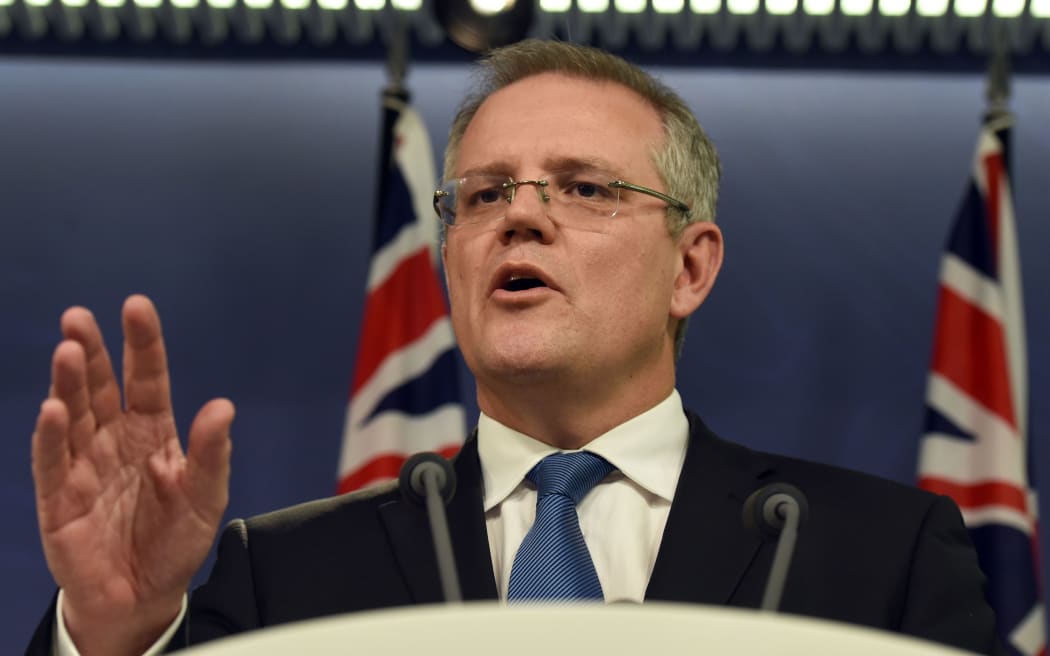Australia's Budget has delivered small tax cuts with the promise of more if its centre-right government is re-elected, with a dramatic shake-up of the tax system beginning in July.

Australian Treasurer Scott Morrison. Photo: AFP
The Liberal-National coalition also unveiled some big spending measures, including a package of personal income tax cuts for low and middle-income earners, as a revenue windfall from company taxes enabled a shift away from its previous "debt and deficit disaster" rhetoric.
The government will continue its $AU75 billion 10-year infrastructure plan to build rail and road projects and a $AU30 billion five-year investment plan for hospitals.
It will also spend $AU2.5 billion in public technology infrastructure, $AU1.6 billion in residential aged care and $AU294 million to improve national security.
"We are no longer borrowing to pay for everyday expenses," Treasurer Scott Morrison told reporters. "We have reached a turning point for debt."
There would be up to $200 a year for low-income earners and up to $530 extra a year for people on middle incomes, Mr Morrisson said.
He said 210,000 more people would also get tax relief as the income bracket is lifted from $87,000 to $90,000 before they start paying the 37 percent tax rate.
Asked whether the tax sweeteners were an attempt to buy swing voters at the next election, Mr Morrison said it was "to reward working Australians who have seen it tough".
The government said it would return the country's finances to a small surplus in 2019/20, a year earlier than planned and after almost a decade of deficits.
The marked improvement in Australia's finances will likely be positive for Prime Minister Malcolm Turnbull after a series of political setbacks. The budget is widely viewed as the unofficial campaign kick-off for federal elections due in the first half of 2019.
Mr Morrison predicted a budget surplus of $AU2.2 billion in 2019/20, a remarkable turnaround on the $AU2.6bn deficit forecast in the government's mid-year review in December.
The projected surpluses increased to $AU11bn in 2020/21 and A$16.6 billion in 2021/22.
Net debt was expected to peak at 18.6 percent of Australia's $AU1.8 trillion GDP in 2017/18, a year earlier than forecast, before falling to 3.8 percent by 2028/29.
The improved budgetary position was welcomed by rating agencies Standard & Poor's Global and Moody's Investors Service.
In a statement after the budget release, S&P said strength in the Australian and global economies, and "fiscal prudence" by the government, had helped ease negative pressure on the country's credit rating.
It said global trade tensions could dampen economic growth among Australia's key trading partners.
"The outlook on the long-term Australian sovereign ratings remains negative for now to reflect these uncertainties," S&P said.
S&P put Australia on a "negative outlook" in mid-2016, citing deteriorating government finances.
Moody's said Australia's AAA rating continues to reflect its strong institutions and solid growth potential.
Economic outlook
The Australian dollar hit an 11-month low as a rally in its US counterpart overshadowed the upbeat budget.
Morrison maintained the government continued to "live within its means" despite the budget spending splash.
Despite the additional expenditure, spending levels were at just below the 30-year average of 24.8 percent.
Australia's economy, which has outperformed many rich world peers since the global financial crisis, has now entered a 27th straight year of growth, but the pace has slowed significantly as the country recalibrates following the end of a once-in-a-generation mining investment boom.
The government predicted domestic activity would accelerate at 3 percent annually through 2021/22, unchanged from December. Its outlook for unemployment and inflation were also unchanged.
The budget included a number of voter-friendly spending plans, as Turnbull seeks to improve his standing after a dual citizenship crisis and a sex scandal involving his deputy, that have seen his popularity plummet in polls from record highs of late 2015.
Revelations of serious misconduct in Australia's powerful banking sector - during an ongoing inquiry the government initially resisted as unnecessary - ramped up the pressure.
The budget did not address that crisis in detail, saying only the government would continue to roll out stronger penalties, powers and enforcement for the sector. It also steered clear of discussing a plan to lower taxes for big businesses, which did not have parliamentary support.

